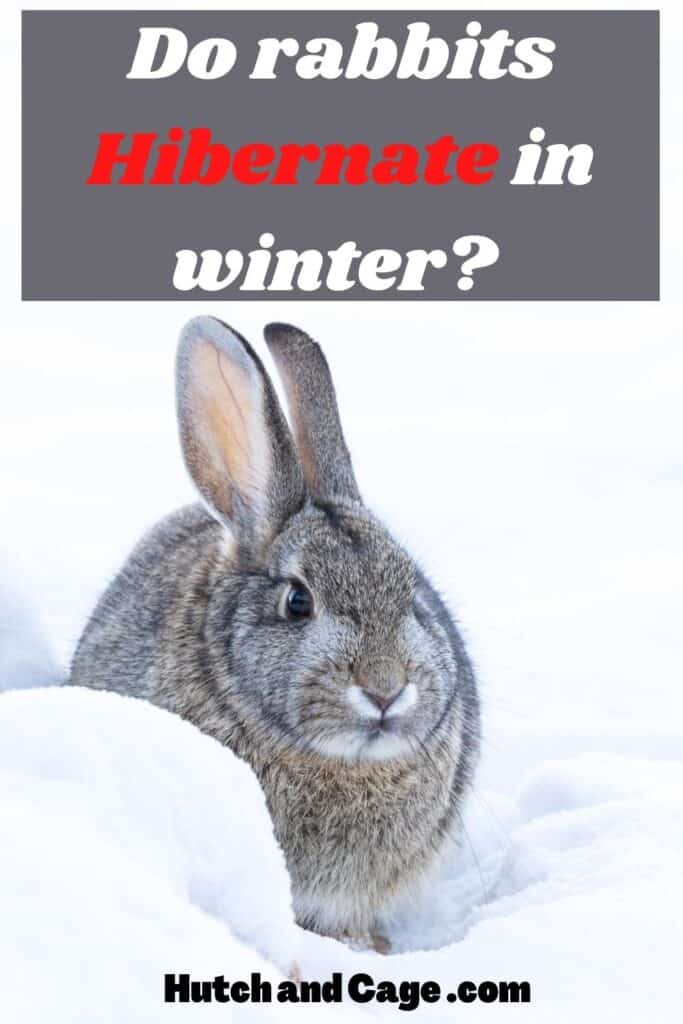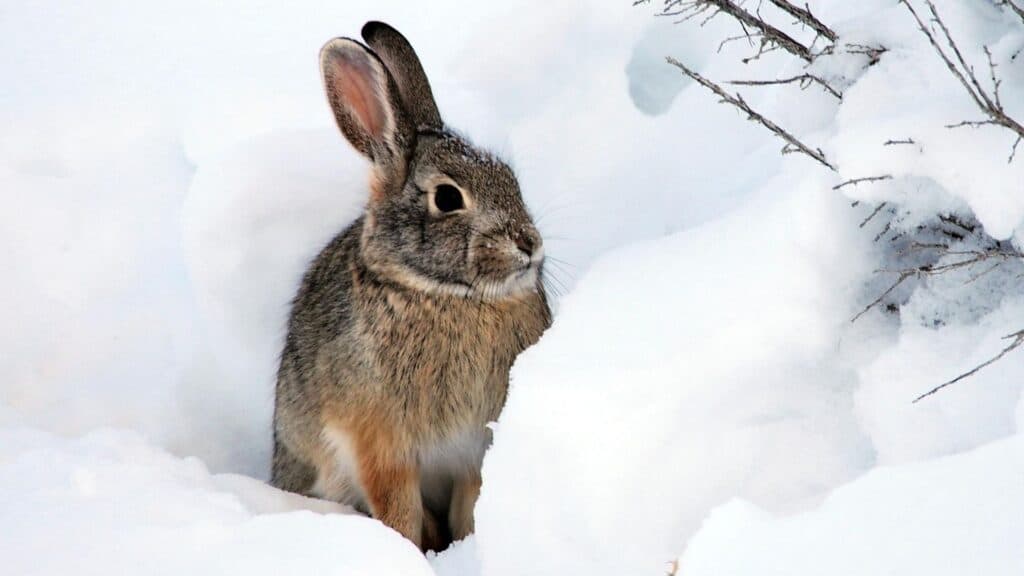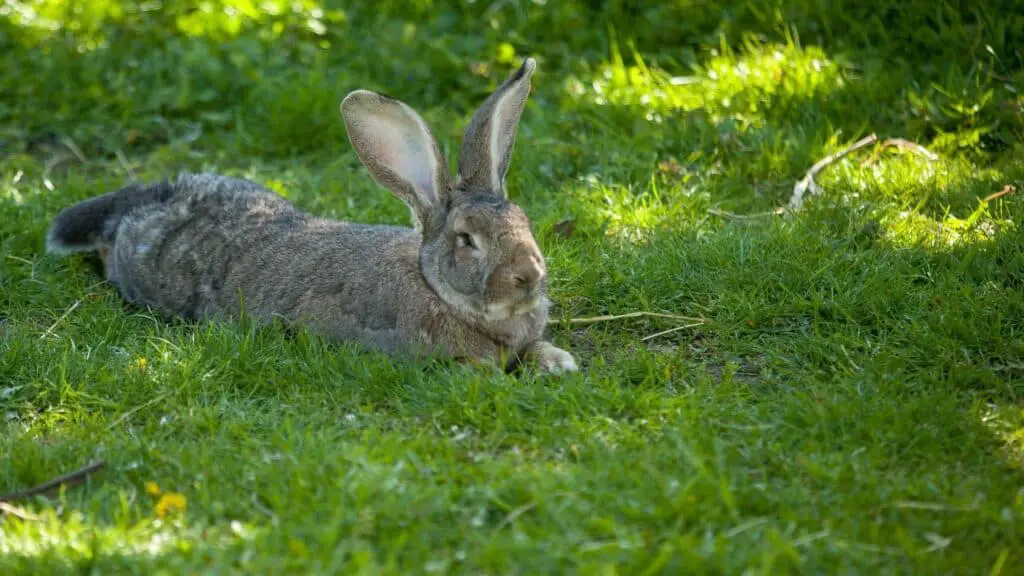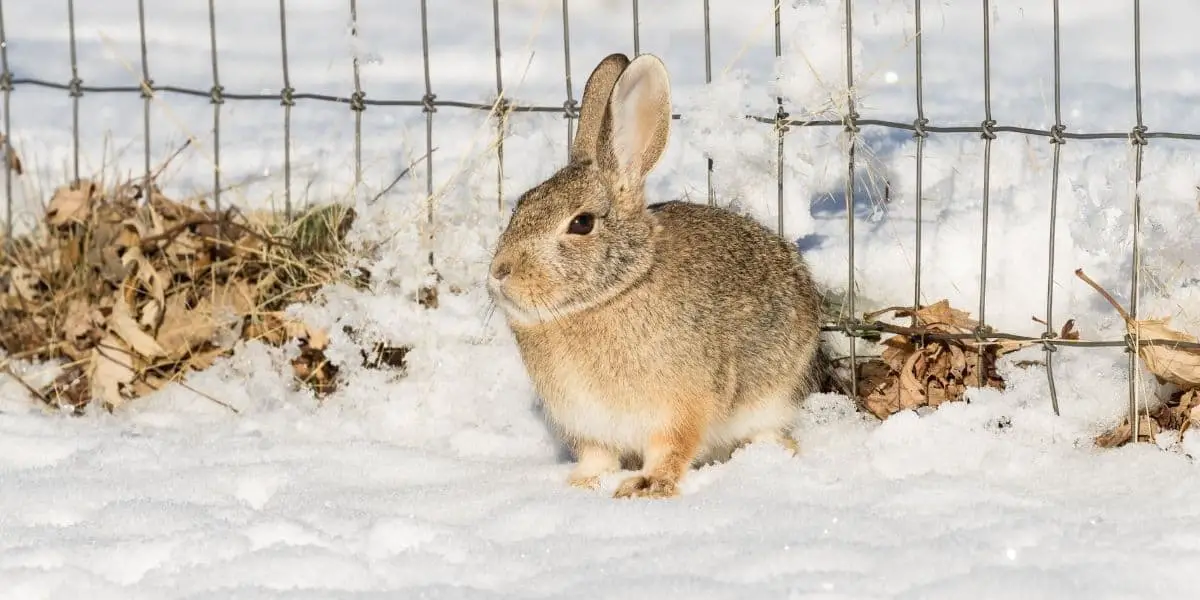Rabbits are animals that do not tolerate extreme temperatures; whether that be the cold of the winter or the heat of summer, if it’s extreme, it will hurt your rabbit, in the case of winter, make sure to keep your rabbit warm and comfortable. Hibernation is something that many pets to survive the cold winters. Pet rabbits do not hibernate.
Do rabbits hibernate in the winter? No, rabbits hibernate in winter, neither pet rabbits nor wild rabbits. On the contrary, they are quite active during winter since they have to deal with the snow, cold weather, and find food.
As you can see, they are quite busy during the winter. In this article, I tell you all you need to know in order to help your rabbit during winter.
Let’s start with these facts.
During the cold months of winter, it’s normal for your rabbit to eat more than usual, since, in its wild state, food is scarce during this time.
Their metabolism makes them gather supplies while they can.
During winter, rabbits increase the amount of food they eat, but this also benefits rabbits with a layer of fat that will serve as thermal insulation.
But this is not enough to withstand the low temperatures of winter.
Its hair also changes, becoming thicker and thicker, but it is still insufficient to protect it from the intense cold.
Therefore, you have to take the necessary care and prevent your rabbit from being exposed to intense cold.

Table of Contents
How do rabbits survive in winter?
Wild rabbits usually survive winter by finding or digging a hiding place that can protect them from predators, cold winter, and close to a food source.
On the other hand, a pet rabbit is a different story and more complicated.
Pet rabbits are used to being taken care of; in this case, you have to help your pet survive the winter.
To help your rabbit go through winter, you will need to provide some specific care during this season, complementing the essential care that rabbits need to live a healthy, active, and happy life.
The type of hutch you provide will be essential. A snug and draft proof hutch like the Eglu hutch will provide a safe, warm, and dry place to hide in winter.
For more information on the Eglu hutch , read our full review click here ↗️
Just follow these steps to assist your rabbit.
1. Condition you home: If your region experiences harsh winters, heating systems will help provide optimal temperatures for your rabbit in winter. However, remember that artificial heating tends to dry out the air, so I recommend spraying water in the room two to three times a week. Remember not to wet the rabbit, but to spray its surroundings.
2. Prepare the cage or hutch: The rabbit cage is its resting place, and it is also its coat, so it must be prepared to provide comfort and shelter during winter. If your rabbit is used to living outside your house, it will be essential that his cage or hutch be protected.
In addition to leaving a blanket at their disposal, remember to cover the rabbit’s cage at night to avoid the entry of cold wind. If your rabbit’s cage is inside the house, remember to place it in an area without drafts and with good lighting.
3. Food: like all mammals that do not hibernate, rabbits tend to increase their food intake during the winter. Its body uses more energy to keep its metabolism stable and fight the cold, so the animal needs a slightly more energetic diet. So make sure to provide all the food your pet will need.
4. Physical activity and mental stimulation: Rabbits are very active and intelligent animals that enjoy exercising even during winter. Ideally, your rabbit should have room to run, jump, and explore its surroundings freely, such as a garden, patio, or deck.
Remember to enrich his cage with toys to stimulate his mind and allow him to develop his cognitive skills. You can also teach your rabbit a good variety of tricks and basic commands, thus enjoying their company and stimulating their intelligence.
5. Preventive medicine: In addition to maintaining excellent hygiene in its cage and environment, your rabbit will need to be vaccinated and go to the specialized veterinarian every six months to verify its health.
An excellent idea is to take your rabbit to the vet before the arrival of winter to provide the necessary preventive care and protect it from the cold.

What temperature is too cold for rabbits?
As we have mentioned, rabbits are better adapted to temperate and cold climates than to very hot regions, where they can suffer from heatstroke quite easily.
There are different breeds of rabbits, so depending on their body characteristics and their place of origin. Temperatures will affect them differently.
In theory, wild rabbits endure temperatures as low as -10ºC/14 °F, provided they have a shelter where they can be protected from the elements.
But if your rabbit is used to living indoors at a stable temperature, being exposed to such cold could severely harm its health.
No domestic rabbit should be exposed to extreme temperatures, whether it’s hot or cold.
On the other hand, we must consider that dwarf rabbits are more vulnerable to cold and climatic changes.
Ideally, they should live in an environment with average temperatures between 18ºC/64°F and 20ºC/68°F in order to avoid respiratory problems and other diseases that the cold can cause in rabbits.
How do I know if my rabbit is getting too cold?
Usually, the body temperature of rabbits is between 38ºC/100°F and 40ºC/104°F, and the optimum temperature for their environment should be around 18ºC/64°F.
When the environmental temperature drops rapidly or abruptly, we can observe the following symptoms of cold in rabbits:
- Tremors
- Muscular stiffness
- Cold muzzle and ears
- Cramps
- Dry Skin
- Slower breathing
- Difficulty breathing
- Slow movements
- Clumsiness
- Inactivity
If your rabbit body temperature is below 36ºC/96°F, symptoms of hypothermia may occur, indicating a more severe decline in its health condition.
Some of the symptoms of hypothermia in rabbits are:
- Loss of appetite
- Reduced heart rate
- Dilated pupils
- Stare
- Depression
- Disorientation
- Fainting
- Collapse
- Sudden death
Do rabbits hibernate in summer?
No, they don’t. Spring and summer are mating seasons, fun, and happiness.
The same goes for wild rabbits, although they have to do a bit more work; they take care of their food supply, houses, and babes.

What do rabbits do in the winter?
Wild rabbits spend their time looking for food and avoiding cold temperatures. While pet rabbits enjoy the home, you have provided.
If you create the proper condition, you will have as much fun with your rabbit during winter as you do in summer.
What do rabbits eat in the winter?
Rabbits are herbivores, so they usually feed on vegetables. One of the main foods in its diet is hay.
It helps them wear down their teeth and supports their digestive system.
Other foods your rabbit might enjoy are carrots, celery, lamb’s lettuce, arugula, and vegetables such as chard.
But like all pets, there is some food they don’t enjoy, like garlic, cauliflower, onion, potatoes.
Make sure not to give them too much fruit since too much sugar can be harmful to them.
Whenever you want to try new food with your rabbit, give it a small amount first, so you can check if it likes it and how it feels.
It’s important to keep in mind that sudden changes in diet can cause digestive problems such as loose stools.
Another thing that rabbits eat is specialized food for rabbits.
These types of food usually have fiber and nutrients that will give the rabbit a healthy and balanced diet.
These animals must consume fiber to prevent them from having gastrointestinal problems and strengthen their defenses.
Also, young rabbits need an extra amount of protein to promote their growth.
With wild rabbits, you can include all that just mention plus this; they eat trees, bush buds, nutrient bark, and twigs.
The other thing they eat is their cecotropes, which is halfway processed food.
This will allow their stomach a chance to gather more energy from the food they’ve already eaten.
Can rabbits die from cold weather?
Yes, especially pet rabbits that are not used to the cold winters.
They’re not prepared to handle these low temperatures. So you must provide all the necessary accommodation for your pet to survive winter.
Can rabbits live outside in winter?
Yes, they can, as long as they have the proper conditions to survive the winter, which means a warm and dry shelter and lots of food.
How do rabbits survive the winter?
Wild rabbits don’t hibernate, but they do find themselves a hollow log, or make a burrow to keep themselves warm. Their diets change too, and instead of eating leafy greens, they eat tree bark, twigs, and seeds.
What do rabbits do when they are cold?
Rabbits don’t usually get cold. They have big pads on their feet to protect them from the cold, and of course their fur coats. If your pet rabbit is breathing through their mouth, or there is blood at the bottom of their nose, they might be too cold and you should try moving their cage somewhere warmer.
Can pet rabbits live outside during winter?
Yes, rabbits have adapted to living outside in cold months, and their bodies are able to keep them warm. If you want to keep your pet rabbit outside, you should make sure they have somewhere warm to sleep.
Can rabbits freeze to death?
It’s not likely that a rabbit would freeze to death. It’s more likely that a rabbit would catch a cold, and their bodies can’t fight it which could cause death.
Conclusion: Do rabbits hibernate in the winter
If you’ve decided to adopt a rabbit as a pet or already have one, you should know that these lagomorphs need special care with the arrival of winter to maintain their good health.
While rabbits cope better with cold than heat, low temperatures and weather changes can increase the risk of developing some common diseases in rabbits, such as colds and respiratory problems.
They can also suffer hypothermia.
But in general, no currently known species of rabbits have the ability or habit of hibernating. Therefore, you will need to pay special attention to your pet diet and well-being during the winter.
This is a beautiful creature, and if you have them as pets, you have to make sure you provide all their needs (which is not that much).





